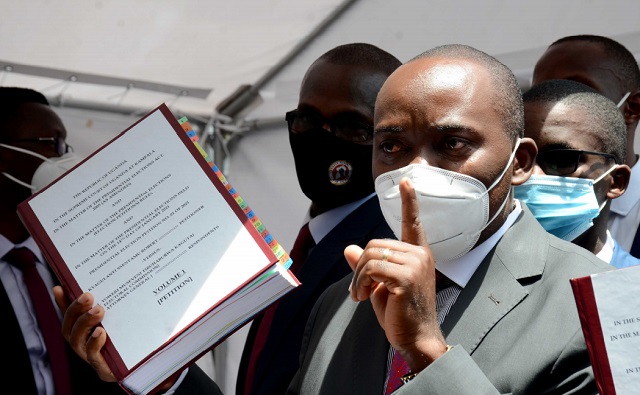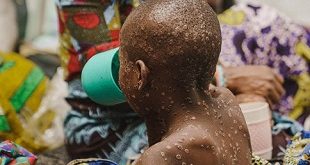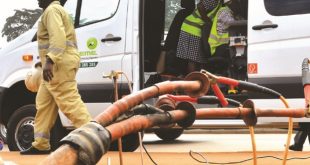
So why did Bobi Wine go there?
Kampala, Uganda | THE INDEPENDENT | On Feb.01 former presidential candidate Robert Kyagulanyi aka Bobi Wine filed a petition at the Supreme Court challenging the 2021 election results that declared the incumbent President Yoweri Museveni winner.
In the petition, Bobi Wine who ran on the ticket of the National Unity Platform (NUP) party that he heads raises 15 issues of electoral irregularities and 10 issues of electoral offences. He makes eight demands to the court, including that the 2021 presidential election be nullified.
Bobi Wine’s petition was expected. But it still came as a surprise because, immediately the results were announced indicating that he had secured only 35.08% of votes cast against the winner, Museveni’s 58.38%, he told journalists that he would not seek court redress in the courts.
He told the Voice of America journalist that the Supreme Court is a mockery because, according to him, it is under the control of Museveni.
“It is a mockery,” he said. “It is firmly in the pocket of General Museveni.”
But on Jan.17 Bobi Wine tweeted on the NUP handle: “I take this painful but nonetheless inevitable leadership decision of urging you to desist from any form of violence as we prepare to challenge the election outcome and its glaring imperfections through the courts of law for the sake of our long-term victory and for Uganda.”
Based on this chronology of events, it would appear that Bobi Wine’s initial decision was not to take his case to the courts. If that is the case, what persuaded him to change course and file a petition in the Supreme Court he has described as a mockery?
Understanding the driving force behind Bobi Wine’s election petition is challenging since in 2001, 2006 and 2016, the majority ruling of the judges was that as much as there had been some election irregularities, they could not substantively affect the final winning margin to warrant overturning the result. Does it mean Bobi Wine this time has the numbers that the judges want to warrant overturning the election?
The main question is why did Bobi Wine finally go to court well aware that the Supreme Court has on three previous occasions dismissed petitions similar to his against Museveni and the EC?
What makes Bobi Wine and team expect to win where others failed?
Or could this be just a case of what experts call ‘weaponising elections,’ which is a tendency for losing candidates in democratic election to reject the results and file petitions in courts of law.
According to experts, since 1990, this has happened in at least 56% of presidential and parliamentary elections in non-established democracies. In sub-Saharan Africa specifically, it has happened about 80% of the time.
In these cases, some of the losers even mobilise supporters into street protests as opposition strongman Kizza Besigye has done after previous elections and they may also boycott second rounds of voting as Raila Odinga did in Kenya in 2017.
According to the experts, very few politicians who are not declared winners of an election go to courts expecting to win the case and have the elections overturned. Most losing politicians go to court for other reasons; including managing their political reputation, using the court cases as leverage to negotiate with the government, and fulfilling psychic needs, meaning benefits that may not be easy to quantify but are important to restore the loser’s standing.
In Bobi Wine’s words, the petition is about “for the sake of our long-term victory.” According to some interpretations, Bobi Wine is using the court petition as part of a long term plan.
According to this view, Bobi Wine could be setting ground for the 2026 presidential election or merely offering his supporters an avenue for venting their frustration after being “cheated.” Many of his supporters could have been disappointed if he had not done anything about their loss.
But he could also be seeking to signal to the government and his support base in European and American capitals that he is willing to work within the constitutional framework to resolve election conflict instead of resorting to violence or protests.
If these observations are correct, Bobi Wine would be behaving exactly as described in an academic paper titled ‘Weaponizing Post-Election Court Challenges: Assessing Losers’ Strategic Motivations’ by professors Aaron Erlich and Saewon Park of McGill University and Nicholas Kerr of the University of Florida, USA.
But Bobi Wine could have taken his case to the Supreme Court basing on recent developments in the handling of presidential election petitions elsewhere on the continent. Bobi Wine’s petition comes amidst a flurry of new knowledge, academic opinion, and court precedents based on recent election petitions in the region.
The Supreme Court of Kenya nullified a presidential election in September 2017 and the Malawi Supreme Court followed suit in May 2020. These countries share similar presidential election laws as Uganda. And it would appear that in annulling the presidential elections in their jurisdictions, they created new precedents that could inform Uganda’s handling of Bobi Wine’s case. In any case, Chief Justice Owiny-Dollo is known for his knowledge of the law, breadth of exploration of issues, and tendency to chart new paths. What new direction will he spring this time?
 The Independent Uganda: You get the Truth we Pay the Price
The Independent Uganda: You get the Truth we Pay the Price




How will the court separate the Presidential and directly elected MPs election considering that they were conducted on the same day using the same EC processes under question by the petition.
Go and ask kenyan courts
Why don’t you take your case to Kenya then?
Exactly my thought, if Supreme Court rules that the presidential election wasn’t conducted in accordance with the law basing on the grounds of the petitioner, then it must follow by default that the entire 2021 elections weren’t in compliance with the law.
You haven’t replied but the gentleman asked a nice question
Ugandans how i wish we could go for dry clean fasting for a week, we would have seen the mighty hand of God upon this nation. We have distanced ourselves from God and thats the FACT, pray my people!!!!!